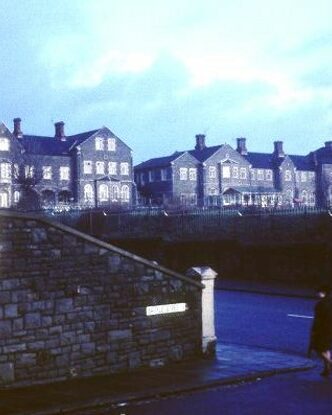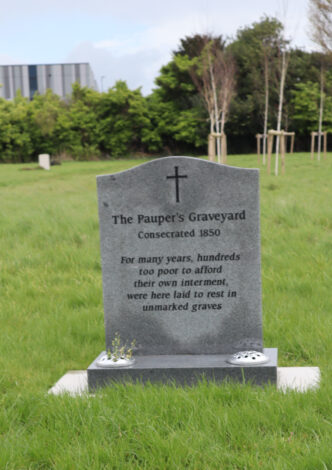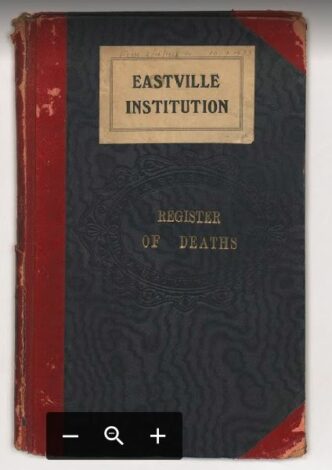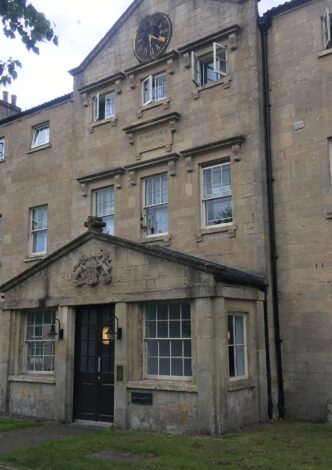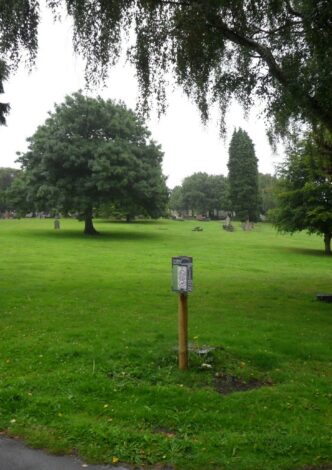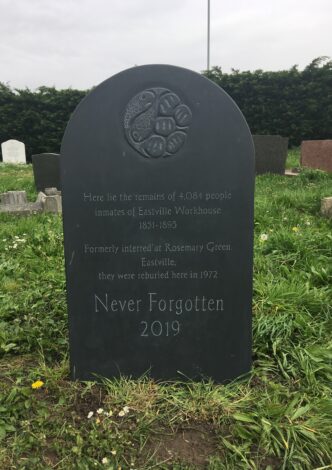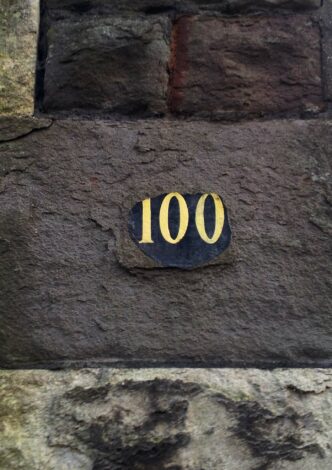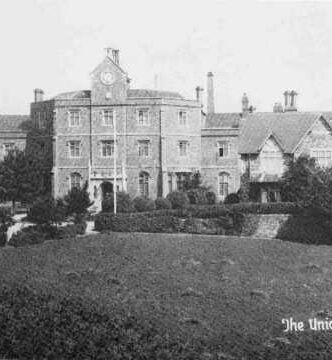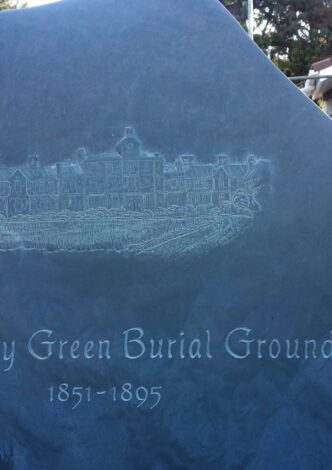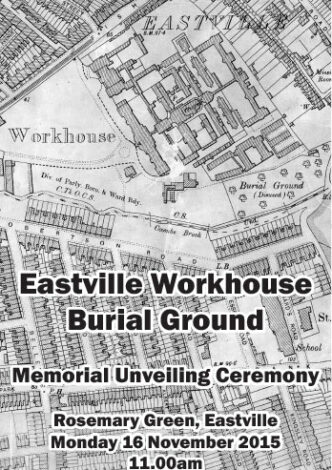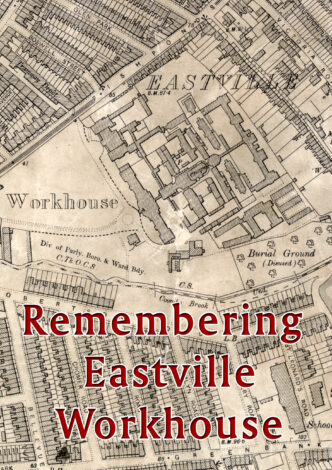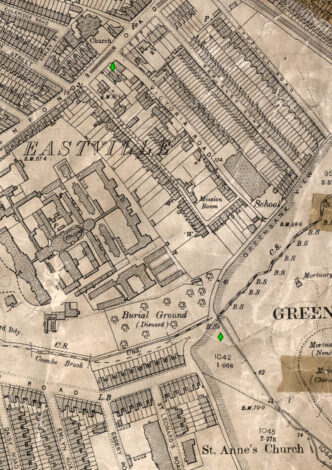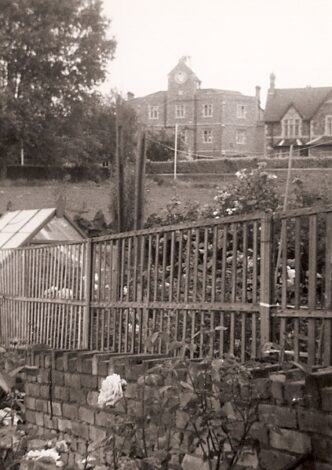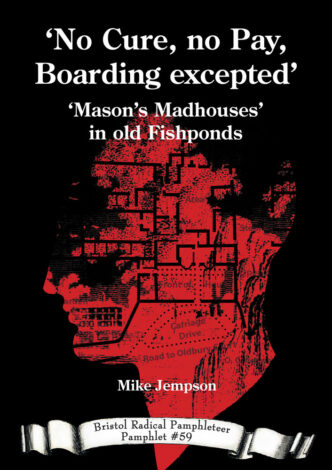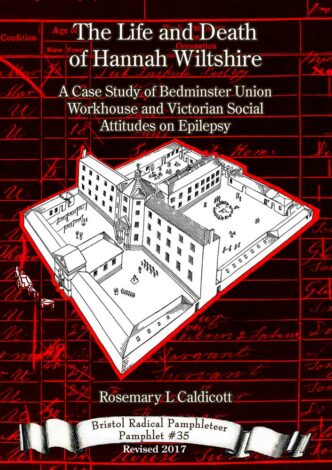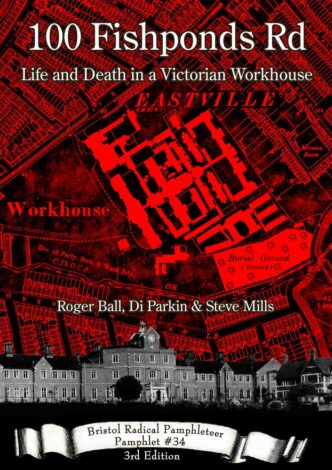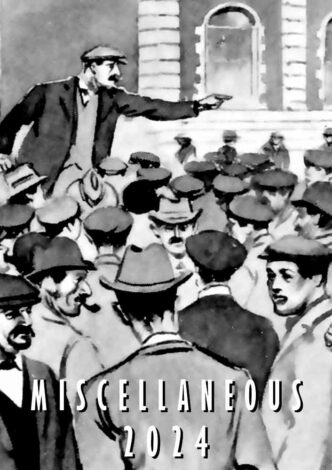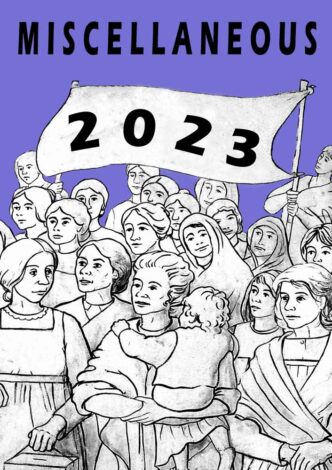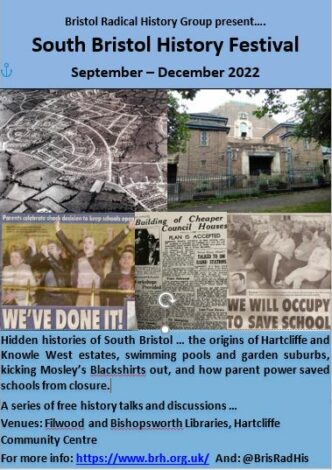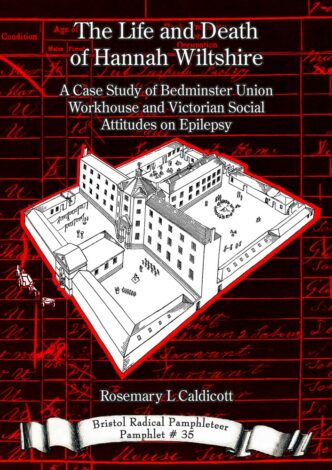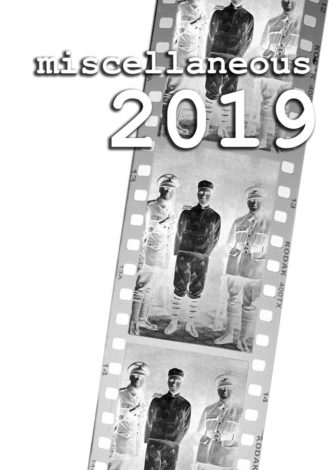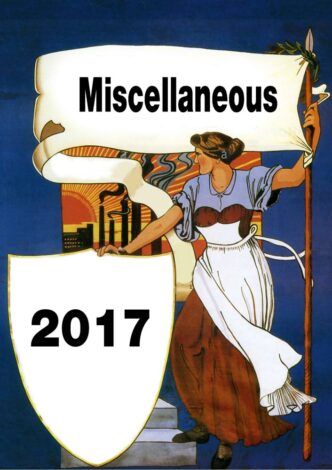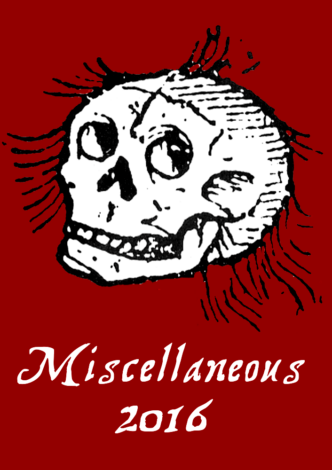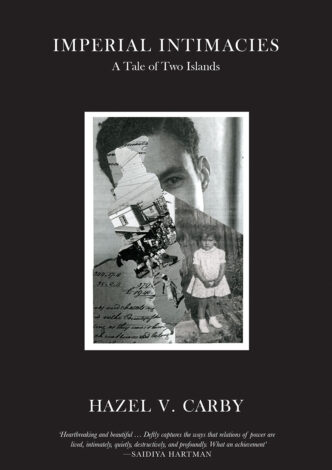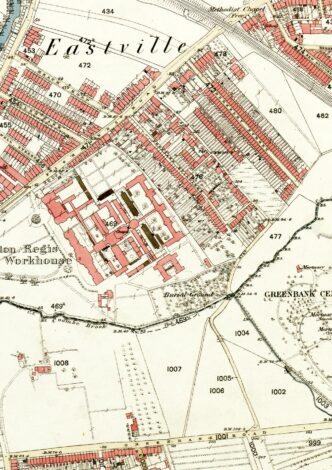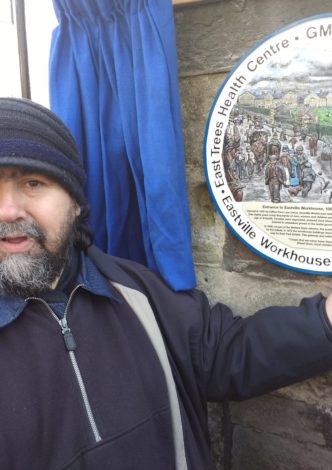The Eastville Workhouse project was launched in 2012 after some members of Bristol Radical History Group (BRHG) had studied an old ordnance survey map of Ashley Down and Eastville (1902). They noticed that the burial ground for the Barton Regis workhouse at 100 Fishponds Rd, Eastville, marked as ‘disused’ in 1902, made up part of present-day Rosemary Green just round the corner from where they lived. After two years of research, BRHG members had not only gathered significant evidence that suggested the remains of the paupers were present at the site, but from the Bristol Record Office, details of over 4,000 men, women and children from the workhouse who were buried in the unmarked graves.
A number of articles were published by BRHG about the project in the summer of 2014, especially after the Galway babies scandal in June, which demonstrated that unmarked graveyards of the ‘forgotten’ paupers including many babies were commonplace in the UK. As a result the Eastville Workhouse Memorial Group (EWMG) was set up after a successful public meeting with local residents. The aim of the group is to raise funds for a permanent memorial to those who lived and died in Eastville Workhouse. Since the launch of EWMG, a number of people studying their family history have discovered from BRHG data that their ancestors lie in the unmarked graveyard at Rosemary Green.
Rosemary Green Burial Ground Data Sheets
The data sheets that contain the names of those who died in Eastville Workhouse and buried in unmarked graves can be found listed in “Rosemary Green Burial Ground Data“.
The Book
The book 100 Fishponds Rd. Life and Death in a Victorian Workhouse uses a combination of quantitative and qualitative evidence and looks at what life in the Victorian workhouse was like, who the inmates were and how they were treated. It considers their life chances once they entered the institution and what happened to them after they passed away.
The Memorials
Eastville Workhouse Memorial Group raised £10,000 to manufacture and install two memorials to mark the burial sites of the more than 4,000 paupers who were inmates of Eastville Workhouse at 100 Fishponds Road. The first, a Welsh slate standing stone, was unveiled at the site of the workhouse burial ground at Rosemary Green, Eastville in November 2015. In 1972 the Eastville Workhouse buildings were demolished in preparation for the construction of the East Park housing estate. During this process the burial ground at Rosemary green was crudely disinterred and some of the remains were re-interred in unmarked common graves at Avonview Cemetery in nearby St George. The second memorial, a gravestone, was installed at the site of these common graves at Avonview Cemetery in May 2019. Both memorials were manufactured and installed by local stone mason Matthew Billington.
The Plaque
In December 2016, as part of the Eastville Workhouse history project, a cast aluminium, painted plaque by local artist Mike Baker was unveiled on the surviving gates to the workhouse at 100 Fishponds Rd. The plaque shows a relief of Eastville Workhouse and Fishponds Rd in the late Victorian period and marks the location of the institution which remains a dark, but important, symbol in the history of East Bristol.
New Eastrville workhouse burial data released – December 2025
Members of Eastville Workhouse Memorial Group (EWMG) have been busy over the last few years transcribing death registers for Eastville Workhouse for the period November 1895 to July 1914. This current data release, covers the location of burial of unclaimed pauper bodies and where possible details of interment of those corpses that were ‘taken by friends’. These amount to, in total, 4,743 internments. These burials largely occurred in the municipal Greenbank cemetry and the private cemeteries, Ridgeway Park and Arnos Vale, which have both since become publicly owned.
Download the data and explanatory notes here.
Stuff linked to this project...
Articles (13)
Finding epidemics During the collation of Eastville Workhouse death register data for the years 1895 to 1914, the researchers noted some unusual clusters of deaths, particularly amongst the young. In a similar manner to our survey in the Victorian […]
Read More
Introduction In 2015 Eastville Workhouse Memorial Group (EWMG) released the death records of more than 4,000 inmates of Eastville Workhouse. These were paupers who were buried over the period 1851-1895 in a piece of waste ground adjacent to the […]
Read More
Introduction The downloadable pdf listed on this page contains transcriptions carried out by members of Eastville Workhouse Memorial Group (EWMG) of the death registers for Eastville Workhouse for the period November 1895 to July 1914 This work was […]
Read More
Trees will grow and a wildflower meadow bloom at Bath’s Union Workhouse Burial Ground. A place of memory and reflection is emerging thanks to the work of local residents, artists and descendants of those buried there, unmemorialised, in unmarked […]
Read More
Introduction From 2014-2019 Eastville Workhouse Memorial Group (EWMG) studied Rosemary Green, a piece of land consecrated and used as a pauper burial ground soon after the new workhouse was built at 100 Fishponds Road in 1847. Eastville workhouse was […]
Read More
Our dead are never dead to us, until we have forgotten them Introduction One evening in 2010 some members of Bristol Radical History Group (BRHG) were poring over some old maps of Eastville and discovered a forgotten burial ground at Rosemary Green, […]
Read More
Where am I? You are on the site of Eastville Workhouse, which opened its doors in 1847. In the 1930s it became an old people's home and was finally demolished in 1972. This page is about the three memorials which are part of the Eastville Workhouse […]
Read More
In 2015, the Eastville Workhouse Memorial Group unveiled a memorial for the 4,084 paupers buried in a mass grave at Rosemary Green. We follow them and the Bristol Radical History Group's efforts to correct this historical wrong, and to bring light […]
Read More
On this site over 4000 men, women and children who died in Eastville Workhouse, known as 100 Fishponds Road, were buried in unmarked graves. A further 118 were given to the medical school. This memorial stands in recognition of all who lived and died […]
Read More
This is a copy of the programme handed out at the Eastville Workhouse burial ground memorial unveiling 16/11/2015. Download the programme here...
Read More
The files listed on this page contain data by decade of the burials at Rosemary Green (marked "Burial Ground (Disused)" on the map below). These are people who died in Eastville Workhouse and were buried in unmarked graves at the site. The files are […]
Read More
A woman before the courts in 1882 said that she preferred the gaol to Eastville workhouse as ‘in the latter she was three quarter starved and worked to death’ Before the end of the Second World War and the creation of the Welfare state and the […]
Read More
Bristol Radical History group (BRHG) is making progress on the project to record and respect the paupers buried in unmarked ground behind the old Eastville workhouse (100 Fishponds Rd), now called Rosemary Green. A key marker of disrespect is burying […]
Read More
Publications (3)
Long before the NHS, those who did not fit ‘the norm’ were consigned to workhouses or to private lunatic asylums. The latter provided a profitable business opportunity, as the wealthy were only too keen to offload family members whose behaviour was […]
Read More
During the year of 1855 rumours of murder and cover up were circulating in the small north Somerset village of Walton-in-Gordano. An epileptic destitute country girl had died in the local institution known as the Bedminster Union Workhouse. Her death […]
Read More
In 2012, radical historians poring over old maps of east Bristol discovered a disused burial ground at Rosemary Green, close to the site of Eastville Workhouse. Over the following years, a team of local researchers revealed that in the nineteenth […]
Read More
Event Series (1)
A series of events linked to the Eastville Workhouse. For more details about the Eastville Workhouse project visit the project page.
Read More
Events (23)
As part of the The Bristol Medico-Historical Society meeting, 'History Around Us', Rosemary Caldicott will be giving a talk: Outcasts of Medicine: Epilepsy, Poverty, and the Workhouse System Discover how epilepsy was misunderstood, feared, and […]
Read More
Inspired by Rosemary Caldicott's Life and Death of Hannah Wiltshire BRHG are pleased to announce that Bedminster based acta and Pick N Mix Theatre have researched, written and produced a play based on this fascinating story about their local […]
Read More
The 1834 Poor Law Amendment Act aimed to prevent the mentally afflicted from being incarcerated in workhouses for long periods. However, studies across the country have demonstrated that large numbers of people with mental health issues were being […]
Read More
In 1855 rumours of murder and a cover up were circulating in the small north Somerset village of Walton-in-Gordano. An epileptic destitute country girl, Hannah Wiltshire, had died in the Bedminster Union Workhouse at Flax Bourton. The Board of […]
Read More
'The Life and Death of Hannah Wiltshire' Accusations of murder and cover up in the Bedminster Union Workhouse were reported in the press during 1855 Thursday, 7th March 2024 at 19:30 This talk by Rosemary Caldicott is based on her popular booklet […]
Read More
People's University of Fishponds - Sun 28 Jan 2024 - 7:00om - The Nissen Hut, Eastville Park, Bristol. Journalist, Fishponds Voice History columnist and Bristol Radical History Group author Mike Jempson will reveal some of the fascinating facts his […]
Read More
Monday 16 October – 7.30pm-9.00pm - Friends of Eastville Park Community Hub (Nissen Hut), Eastville Park, Near Park Avenue car park, Bristol BS5 6QG In 2015, to great public interest, Eastville Workhouse Memorial Group released details of more than […]
Read More
Pill Library and Children's Centre, Crockerne House, Underbanks, Pill BS20 0AT For more details and booking see here. North Somerset Libraries are excited to host a series of talks by Bristol Radical History pamphleteers. Visit www.brh.org.uk to find […]
Read More
In 1855 rumours of murder and a cover up were circulating in the small north Somerset village of Walton-in-Gordano. An epileptic destitute country girl, Hannah Wiltshire, had died in the Bedminster Union Workhouse at Flax Bourton. The Board of […]
Read More
A Celebration of the Book - Sat 11th June St Andrews Church Centre, Old Church Rd, Clevedon BS21 7UE Funded by Clevedon Community Bookshop Cooperative, Bookbinders, book artists, paper-makers, book makers, independent publishers and pamphleteers come […]
Read More
Clevedon Library, 37, Old Church Rd, Clevedon BS21 6NN Author Rosemary Caldicott focuses on the draconian workhouse system that housed the vulnerable poor, and in particular women and children. Rosemary will be examining the history of the workhouse […]
Read More
Elaborate funeral ceremonies became very important to middle-class Victorians, with increasingly meticulous rituals designed to mark the passing of family members. However, for the Victorian poor, things were very different. After the introduction of […]
Read More
As part of their History Week, Bedminster Library (Bedminster Parade, Bedminster, Bristol BS3 4AQ) have a talk by Rosemary Caldicott, author of The Life and Death of Hannah Wiltshire: A Case Study of Bedminster Union Workhouse. Rosemary will tell the […]
Read More
In 2012 Bristol Radical History Group launched a project to research into the thousands of unmarked graves of paupers from the Eastville workhouse (at 100 Fishponds Road) who were buried in nearby Rosemary Green. In 2014 the Eastville Workhouse […]
Read More
Congresbury History Group, Congresbury Methodist Hall, 2 High St, Congresbury, Bristol BS49 5JA Roger Ball, co-author of 100 Fishponds Rd: Life and death in a Victorian workhouse explains how a team of local researchers revealed that more than 4,000 […]
Read More
Clevedon Civic Society, St Andrew’s Church Centre, Old Church Road, Clevedon, BS21 7UE Rosemary Caldicott, author of The Life and Death of Hannah Wiltshire: A Case Study of Bedminster Union Workhouse tells the true story of how in 1850s the local […]
Read More
Downed Local History Society. Downend Folk House, Lincombe Barn, Overndale Road, Downend, Bristol, BS16 2RW Bedminster: the true story of how the local community pulled together to uncover murder in the workhouse. Eastville: The history of life death […]
Read More
100 Fishponds Rd, Pedestrian Entrance to East Trees Health Centre, Bristol BS5 6BF As part of the ongoing Eastville Workhouse history project a cast aluminium, painted plaque by local artist Mike Baker will be unveiled on the surviving gates to the […]
Read More
Members of the Eastville Workhouse Memorial Group have used death registers at Bristol Record Office to identify the people given pauper's burials at Rosemary Green adjacent to the site of Eastville Workhouse. They found the names of over 4,000 men, […]
Read More
On Rosemary Green, Eastville, BS5 6LB. Residents of East Park Estate are to unveil a memorial to more than 4,000 men, women and children who died in Eastville’s notorious Workhouse between 1851 and 1895 and were buried in unmarked paupers’ graves in […]
Read More
Funeral ceremonies were very important to middle class Victorians, with detailed and often elaborate rituals to mark the passing of cherished family members and those deemed ‘important’. But for paupers who died in the workhouses, things were very […]
Read More
Planning meeting regarding Eastville Workhouse and remembering the paupers buried in Rosemary Green. Thursday 9th October 7.00pm-9.00pm. St Anne's Church, St Leonards Road, Greenbank, Bristol, BS5 6JN It has been over a month since we first met to […]
Read More
Public meeting St Anne's Church, St Leonards Road, Greenbank, Bristol, BS5 6JN Over the last two years local historians from Bristol Radical History Group (BRHG) have been researching an old burial ground that lies on Rosemary Green (BS5 6LB) between […]
Read More
Book Reviews (1)
This is an eloquent and angry account of Professor Hazel Carby’s family history linked to the shameful history of the British Empire. She is painfully honest about the relationship of her own parents - her mother born in Wales, her father from […]
Read More
Blog (3)
The following two press releases have been released this week (07 December 2025) and can be downloaded in pdf format here: Press release 1: Bristol Press release 2: National Press release 1: Bristol Pauper burials in private and public cemeteries in […]
Read More
Eastville Workhouse Memorial Group (EWMG) was formed in 2014 after a public meeting with residents of Eastville and Greenbank in East Bristol. The primary aim of the group was to research and publish the names and details of the inmates from […]
Read More
It is with great sadness that we heard of the death of Mike Baker on 12th March 2020 at the BRI. I first met Mike Baker around twenty years ago when he was leading a local history walk around Easton with fellow historian Jim McNeil. Mike and Jim were […]
Read More
